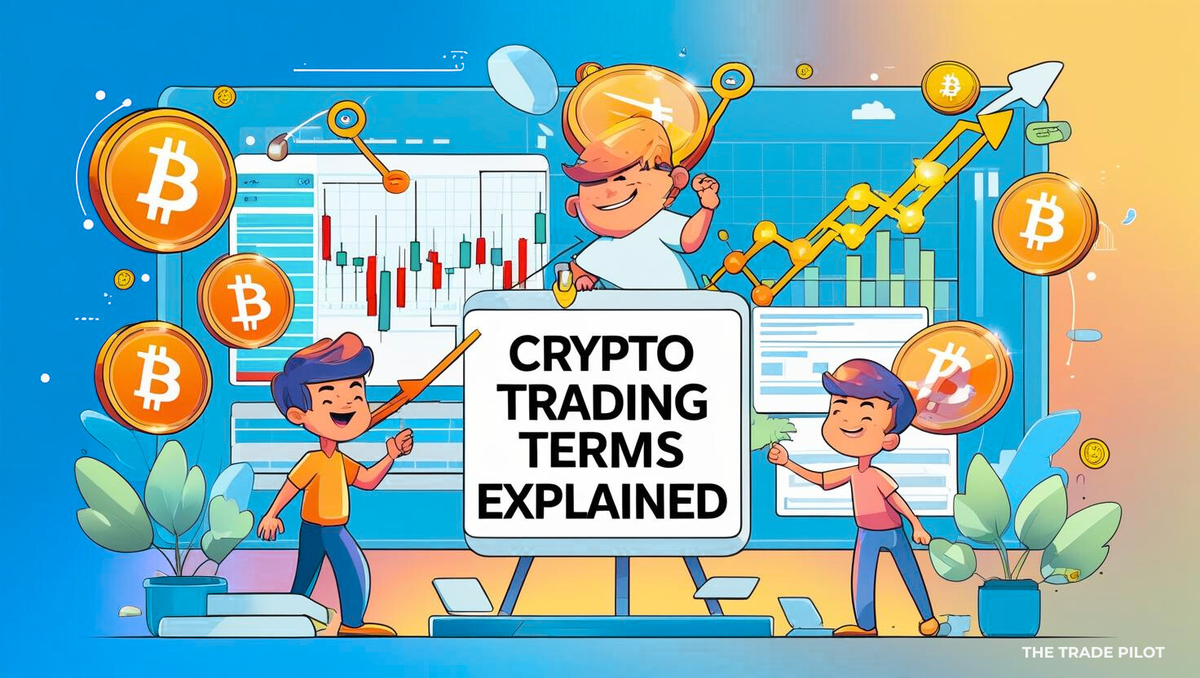New to crypto trading? This A-Z glossary breaks down essential terms every beginner should know before diving into the market.
The world of cryptocurrency trading can feel overwhelming at first, especially with all the jargon thrown around. This beginner-friendly glossary will help you understand the essential terms you’ll encounter on your crypto journey. Whether you're starting with Bitcoin or exploring trading bots, this guide is your go-to reference.
A
Address – A string of characters used to send and receive cryptocurrency.
Altcoin – Any cryptocurrency other than Bitcoin.
B
Bear Market – A period of declining prices.
Bitcoin – The first and most well-known cryptocurrency.
Blockchain – A decentralized, digital ledger that records transactions.
C
Candlestick Chart – A chart type used to represent price movements. Each "candlestick" shows the open, close, high, and low prices for a specific time period.
D
DCA (Dollar-Cost Averaging) – A strategy where you invest a fixed amount regularly, regardless of the asset’s price. Helps reduce the impact of market volatility.
DeFi (Decentralized Finance) – Financial services built on blockchain without traditional intermediaries like banks.
E
Exchange – A platform where cryptocurrencies are bought, sold, or traded.
F
FOMO (Fear of Missing Out) – Buying in a rush due to market hype.
FUD (Fear, Uncertainty, Doubt) – Negative sentiment that can cause panic selling.
Fork – A split in a blockchain that creates two separate versions.
G
Gas Fees – Transaction fees on a blockchain, especially Ethereum.
Grid Trading – A strategy that places buy and sell orders at set intervals above and below a set price to profit from market fluctuations.
H
Halving – An event in Bitcoin where mining rewards are cut in half, reducing supply.
HODL – A misspelled version of "hold"—refers to keeping your crypto long-term regardless of price swings.
Hash Rate – The speed at which a computer completes an operation in the Bitcoin code.
I
ICO (Initial Coin Offering) – A fundraising method where new cryptocurrencies sell tokens to early investors.
J
Junk Coin – A term for cryptocurrencies with little or no value or utility.
K
KYC (Know Your Customer) – The process of verifying a user's identity on an exchange, usually required to prevent fraud.
L
Liquidity – How easily an asset can be bought or sold without affecting its price.
Limit Order – An order to buy or sell at a specific price or better.
M
Market Cap – The total value of a cryptocurrency’s circulating supply.
Market Order – Buys or sells immediately at the current price.
Margin Trading – Trading using borrowed funds, allowing for larger positions but with higher risk.
N
NFT (Non-Fungible Token) – A unique digital asset that represents ownership of a specific item or piece of content, such as art or music.
Node – A computer that helps maintain a blockchain by validating transactions.
O
Order Book – A list of buy and sell orders on an exchange, showing demand and supply.
Off-Ramp – A way to convert crypto back into fiat currency.
P
P2P (Peer-to-Peer) – Trading directly between users without intermediaries.
R
ROI (Return on Investment) – A measure of the profit or loss made on an investment relative to its cost.
Rug Pull – A scam where developers abandon a project and run away with investor funds.
S
Satoshi – The smallest unit of Bitcoin, named after its creator.
Smart Contract – A self-executing contract with terms written into code.
Stablecoin – A cryptocurrency pegged to a stable asset like the US Dollar to reduce volatility.
Stop Loss – Automatically sells an asset at a set price to limit losses.
T
Token – A digital asset built on an existing blockchain, like ERC-20 tokens on Ethereum.
Trailing Stop Loss – Moves with the market price to lock in profits while limiting losses.
Trading Volume – The total amount of an asset traded over a period.
U
Utility Token – A token used for a specific purpose within a crypto ecosystem, such as paying for services.
Uniswap – A popular decentralized exchange for swapping ERC-20 tokens.
V
Volatility – How much the price of an asset fluctuates. Crypto is known for high volatility.
Validator – A participant in a proof-of-stake network who verifies transactions.
W
Wallet – A tool (hardware, software, or online) to store, send, and receive cryptocurrencies.
Whale – A term for individuals or entities that hold large amounts of crypto.
Y
Yield Farming – Earning rewards by lending or staking crypto assets in DeFi (Decentralized Finance) platforms.
Z
Zero Confirmation – A transaction that hasn't been confirmed on the blockchain yet. Considered risky until confirmed.
Understanding crypto terms is your first step toward becoming a confident trader or investor. Keep this glossary handy as a reference, and don’t hesitate to revisit it when you encounter new lingo on your journey.
Ready to move from terms to action? Check out our guides on how to set up your first trade with The Trade Pilot!

